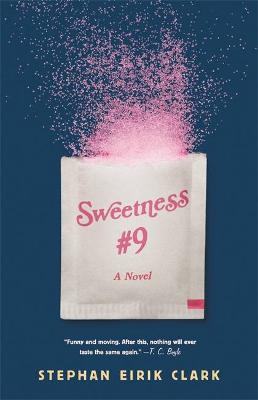Reviewed by Leah on
Most of my problem with the novel stems from the synopsis - the synopsis makes it sound like David Leveraux works at Gold, Olivetti and Dark for ages, working on sweetness #9, when in fact, it only encompasses the first few pages, before he is swiftly fired and carted out, on account of his inability to keep his mouth shut about what it's doing to his rats. Although, to be fair, if I had found a favourite rat named Louis, I too may have started to shout and yell if I thought the sweetener I was giving him was perhaps going to make him kill himself, but only because I'm a sentimental fool, more worried about Louis than anything else. I just thought for something so important to the novel, we would have more time spent on it, but it was over and done with before you could blink (well, it wasn't over and done with, because David grapples with his guilt over not speaking up the whole novel, but you get what I mean.)
The whole novel is pretty much all about sweetness #9's effects on people, or what seems to be sweetness #9's effects on people, because it's never actually proven. Perhaps it all was indeed down to the "American effect". Who knows? It's never explicitly clear, unless I missed it. It's also about David's guilt. David is a guilty, guilty man. Some may say paranoid, too. He spends the whole novel caught up in sweetness #9, and his whole life is dictated by it. His wife is addicted to diet sodas, his daughter goes on, and on, and on, and on some more, about the dangers of sweetness #9, his son is verbless. And all around him, all he can see is his guilt. It permeates every page. But from what I can tell, even if David had spoken up, there's no telling sweetness #9 would have been stopped. So it's kinda irrelevent. What I did enjoy was Ersnt's story, he becomes David's new boss after a period of.... well, David has a breakdown, and Ersnt's comes in and helps him out giving him a new job, and Ersnt was in Germany during the war, serving Hitler and it was exciting to hear his story.
Sweetness #9 was very interesting, I'll give it that. I enjoyed David's narrative, even if it was sometimes a bit long-winded, and he sometimes got off point, but he had his moments of brilliance and I did chuckle a few times. The novel takes a somewhat bizarre turn during the last quarter, which I wished had come in sooner, especially as there was no conclusion to it - what had happened? Why had it happened? Who was to blame? There were too many questions and not enough answers, for some things. But overall it was an interesting, if sometimes scary look, at just what goes into our food. Because I adore shows like The Big Bang Theory, I quite appreciated the science of being a flavorist. (And I'd love to know Sheldon Cooper's take on them.) It's definitely a very on-point novel (and it made me fearful of diet soda's, lemme tell you) and I think people will enjoy it. I enjoyed it, for the most part, I just wished it were a teensy bit funnier, a little less serious, but overall, it was interesting.This review was originally posted on Girls Love To Read
Reading updates
- Started reading
- 25 July, 2014: Finished reading
- 25 July, 2014: Reviewed
